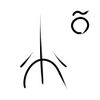Contionary:coúc': Difference between revisions
Jump to navigation
Jump to search
m →Noun: replaced: sentence in Soc'ul' here|translation here → | (2), removed: Category:Soc'ul' terms missing example sentences |
No edit summary |
||
| (6 intermediate revisions by 2 users not shown) | |||
| Line 1: | Line 1: | ||
==Soc'ul'== | ==Soc'ul'== | ||
{{wacag|endocannibal}} | |||
===Etymology=== | ===Etymology=== | ||
{{ | {{qsc-inh|kʷəuːkʷʰə|que-|woh-que<c:woh->}} | ||
===Pronunciation=== | ===Pronunciation=== | ||
{{ | * {{IPA all|qsc|[kʷo̞˩wˀkʷʰ]}} | ||
===Noun=== | ===Noun=== | ||
{{ | {{qsc-n|2}} | ||
# human cannibal | # human endocannibal, cannibal of one's own people | ||
#: {{ux| | #: {{ux|qsc||}} | ||
# man-eating animal | # man-eating animal | ||
#: {{ux| | #: {{ux|qsc||}} | ||
For nonhuman animals that eat others of their kind, see {{term|jiñ'ol}} | For nonhuman animals that eat others of their kind, see {{term|jiñ'ol}} | ||
Latest revision as of 23:29, 11 October 2025
Soc'ul'
| Wacag logograph |
|---|
 |
Etymology
From Sekhulla kʷəuːkʷʰə, from Wascotl *que-*woh-que.
Pronunciation
Noun
coúc' 2 (plural/indefinite ez' coúc')
- human endocannibal, cannibal of one's own people
- (please add the primary text of this usage example)
- (please add an English translation of this usage example)
- man-eating animal
- (please add the primary text of this usage example)
- (please add an English translation of this usage example)
For nonhuman animals that eat others of their kind, see jiñ'ol